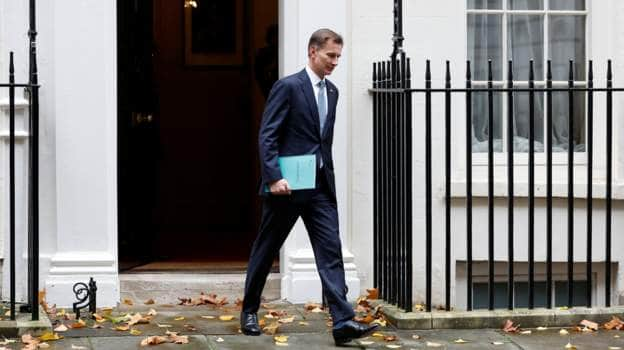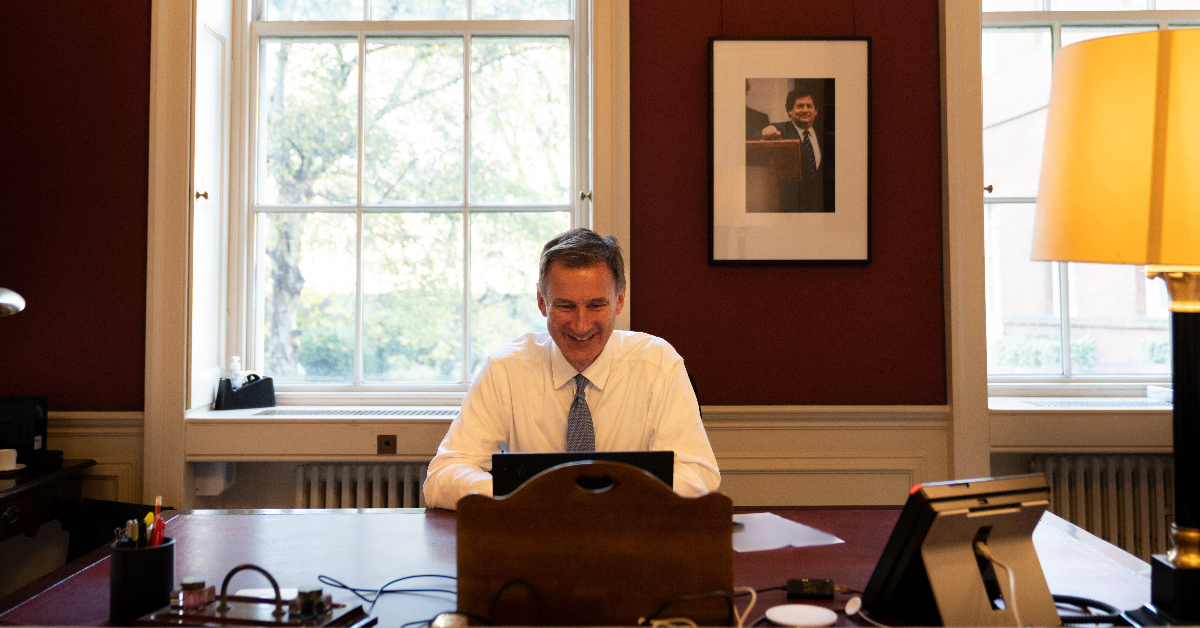https://www.bbc.co.uk/news/live/uk-63591754
No sign of Liz Truss in Commons
It’s still only really a matter of weeks since Liz Truss and Kwasi Kwarteng’s “mini-budget” .
Former PMs Boris Johnson and Theresa May are in the chamber, but no sign yet of Liz Truss.
More people to pay top rate of income tax
The chancellor says the threshold for when the highest earners start paying the top rate of tax will also be brought down from £150,000 to £125,000.
Energy firms profits targeted with expanded windfall tax
Chancellor Jeremy Hunt has confirmed that the energy industry will be hit with an expanded windfall tax of 35% up from 25%.
Motoring tax system to be made ‘fairer’
The Chancellor has announced electric vehicles will no longer be exempt from Vehicle Excise Duty from April 2025 to make the motoring tax system “fairer”.
The income tax personal allowance threshold will be frozen until 2028
This means millions of people will end up paying more in tax.
Freezing the thresholds means that tax bands will stay the same, even as people’s pay goes up. So as wages rise, the proportion of earnings that we pay tax on will increase, and more people will move into higher tax brackets. The thresholds were already frozen until 2026.
Spending squeeze on government departments - except health
Jeremy Hunt has confirmed that there will be spending squeezes on government departments. He says that they will have to take “tough decisions to deal with inflationary pressures in the next two years”.
The health budget will be protected though - and the chancellor said a strong NHS was at the heart of the prime minister’s vision for the country.
Hunt says he is committed to helping people raise their income, find work and become financially independent.
To this end, he announces he will ask over 600,000 more people on universal credit to meet with work coaches “so they can get the support they need to increase their work hours or earnings.”
Hunt says another £280m will be invested to help the Department of Work and Pensions to crack down on benefit fraud and errors in the next two years.
The government’s review on the pension age will also be published in early 2023, he adds.
Hunt says in 2023 and 2024 the government will invest an extra £2.2bn in schools.
Hunt says schools and the NHS in Scotland, Wales and Northern Ireland also face pressure.
He promises an extra £1.5bn funding for the Scottish government, £1.2bn for the Welsh government and £650m for the Northern Ireland executive for “next year, the year after, and every year thereafter.”
Sizewell C nuclear plant going ahead
Jeremy Hunt says contracts will be signed in the coming weeks to get the Sizewell C nuclear plant in the south east of England off the ground.
Sizewell C is expected to provide up to 7% of the UK’s total electricity needs, but critics have argued it will be expensive and take years to build.
The plant is not expected to begin generating electricity until the 2030s.
Northern Powerhouse rail and HS2 to go ahead
Hunt goes on to confirm that rail projects will go ahead as planned: the Northern Powerhouse rail, the HS2 and the East West Rail.
Millions set to pay more for energy from April
Help for energy bills will be extended, but it will be less generous, Hunt confirms.
This means millions of households will see their energy bills go up by hundreds of pounds a year from April.
Pensions to rise by 10.1% from April
Hunt confirms that pensions will rise in line with September’s inflation rate of 10.1%.
Benefits to rise in line with inflation (10.1%)
The chancellor says means-tested benefits, including Universal Credit, will also rise in line with September’s inflation figure of 10.1% from next April.
By law, some disability benefits must rise in line with inflation each year anyway.
National Living Wage to rise
The chancellor has confirmed that the National Living Wage will be increased from £9.50 an hour for over-23s to £10.42 from April next year.
The National Living Wage goes up every April, boosting the pay of around about two million people. But the new rates are announced months in advance, to allow firms to prepare.
Targeted support for cost of living
The chancellor announces there will be targeted support with the cost of living for those on low incomes, disability benefits and pensioners.
Additional payments of £900 will be paid to those on means-tested benefits, £300 to pensioner households and £150 to people on disability benefits.
Rent rises in social rented sector capped
The chancellor has also said that rent increases in the social rented sector will be capped at 7% in the next financial year.
![]()








